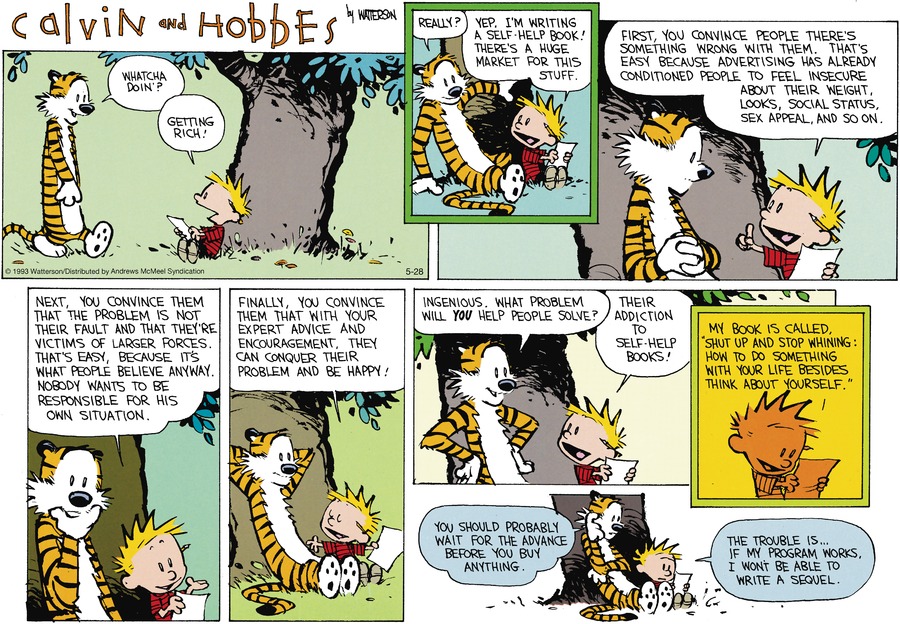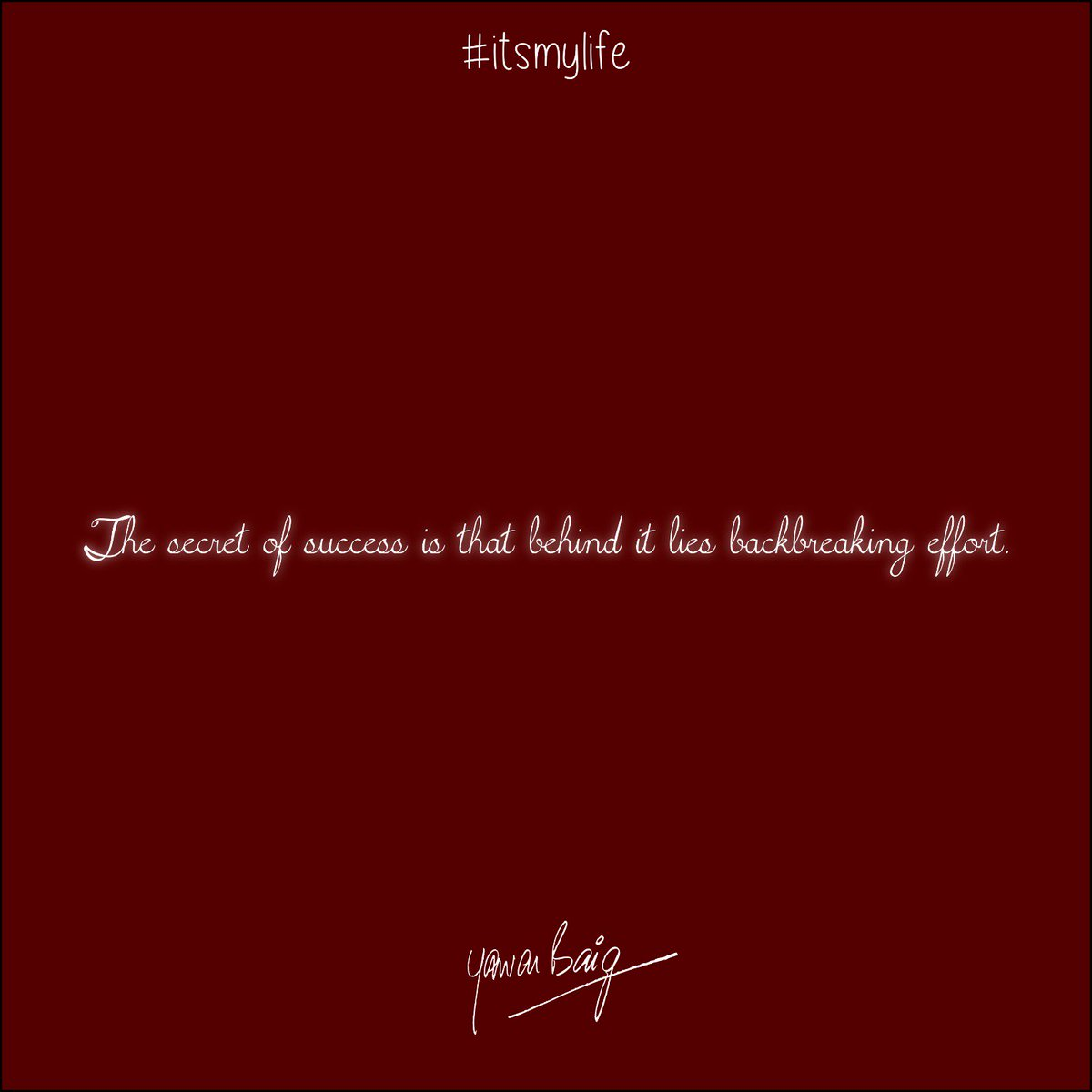
How to beat Goliath
Because size doesn’t matter
I have formulated 6 rules which I call David’s rules. These are for anyone facing the big one ...
The ‘School’ as we know it, is an outcome of the Industrial Revolution (1760-1840) designed primarily to free both parents to work in the factories. It was not designed with the children in mind, except to the extent of how to keep them organized and orderly and create obedient, compliant individuals who will not question authority and will do what they are ordered to do. If you don’t believe me, see what we reward or punish students for. See what we encourage and what we discourage. See how we treat students who ask no questions and do what they are told versus those who ask why they should obey us or suggest other ways of doing the same things. See what we examine students for; random recall within a specific time-frame or genuine understanding especially about applying the learning. That’s why I love Calvin & Hobbes.

I went to one of the best schools of the time, The Hyderabad Public School about which I have written in another blog post. A lot of what I have written here, both the aspirational and regrettable, comes from my experience there. The benefit of all experience is in that we can learn from it. I hope I did. I am now passing that on. Not everything we try succeeds. But nothing succeeds until we try it.
The most critically important thing to teach children is values, ethics and morals. The only way to teach them is by demonstrating them in our lives, as parents and teachers because children listen with their eyes and don’t care what you say until they see what you do. I am including parents in this because education begins and ends in the home. Teachers can help in that and can be the most valuable resource. But barring exceptions, no teacher can supplant the parent. Parenting is a contact sport. It can’t be outsourced to the school. Please remember that they are your children. Please remember that whether you like it or not, you are a role model for your children. Your choice is to decide what kind of role model you want to be – one that they can look up to or one that they must look down on. Anyone who has children (or teaches) has no such thing as a private life. Whatever you do is under the spotlight, will be noticed, learnt, and emulated. If there is any gap between the talk and the walk your credibility with your children will fall through it.
Our present methods of teaching which are inflicted on by far the vast majority of children the world over are the single biggest cause for killing the imagination that every child is born with and making them into square blocks which fit our own frightened, constrained and slavish worldview. Those who comply we ‘pass’ and those who challenge it and refuse to succumb, we ‘fail’. The occasional among those we ‘fail’, go on to great fortune. The vast majority disappear, never to be heard from again. Destroyed by the education system, they didn’t deserve or ask for.

I recall the story of young Tommy; one of the stories that do the rounds on the internet. It is said that Tommy’s teacher asked the class to write an essay about their dream. Next day all the children brought their essays to class. The teacher read them all. But when she came to Tommy’s essay she was astounded and even angry. She wrote a big 0 at the top of the essay and handed Tommy his book. Naturally poor Tommy’s face fell when he looked at the teacher’s notation. He took back his book and silently walked back to his seat. The teacher saw the look on the little boy’s face and took pity on him. She called him back and said, ‘Tommy, your dream is ridiculous. It is fantasy. It is totally unrealistic. That is why I failed you in the test. However, I will give you another chance. If you re-write this dream and bring it back tomorrow, I will give you some marks.’ Tommy listened in silence, nodded agreement and returned to his seat. The eyes and smirks of all those who had ‘passed’ were on his face. They were the ones with realistic dreams which the teacher liked.
Next day Tommy handed in his essay to the teacher. The teacher scanned through it and was astonished to see that there was no change. She called Tommy to her desk in an injured tone and said, ‘Tommy, didn’t you understand what I told you? I said I would give you marks if you changed your dream. You have done nothing here! I am sorry I can’t give you any marks.’
Tommy looked at her and said, ‘Teacher, I thought about what you said and decided that I will let you keep your marks, and I will keep my dream.’
It seems strange to me that if I were asked to define the biggest challenge of the teacher, I would say, ‘It is to teach children how to deal with a world that we know nothing about.’ In such a world, imagination is the key resource that they will need. Without imagination they would be floundering trying to find answers in history or ‘facts’ that they had been taught. But they would never find those answers because they simply aren’t there. Yet the thing that most schools do with amazing efficiency is to kill the child’s imagination as quickly as possible. And sadly they are very successful in doing so.
Take for example how science is taught. It is taught in a way that is no different from history, for example. It is taught as a ‘fact’ course. Whereas science is not about fact at all but about constant discovery. Science is about constantly discovering how little we know. Science is not about answers but about learning to ask the right questions, learning to analyze data with a willingness to be proved wrong, learning to design experiments to disprove our most dearly loved models, knowing that only if the experiment failed could we say that our model is correct. Not forever, but until we come to the next discovery.

Teaching is not about answering questions but about raising questions – opening doors for them in places that they could not imagine. Teaching is about teaching them the tools of learning which will enable them to pursue learning all their lives. Not answer questions – end all discussion and pass exams. That is the reason why the vast majority of children never open a science book once they finish school. That is the reason why there is a serious global shortage of scientists. The whole approach to teaching must change – from teaching solutions and answers to teaching tools to pursue lifelong learning. Even when we teach what we know – the answers – we need to teach them how we arrived at those answers and then ask them, ‘If you faced this issue, what questions would you ask to find an answer.’ We need to focus far more on derivation, problem solving methodology and analytical skills than on actually arriving at some formula or solution.
The same malaise plagues other subjects as well. In history we concentrate on dates and places far more than on lessons learnt and ways of applying them today. When was the last time you heard a history teacher ask questions like: ‘What did we learn from the British Colonial period in Indian history the reflection of which we can see today? What can we learn from that period which we can apply to our lives today? What can we learn which will help us to find solutions to our problems today? Which problem? What is the solution?’ Instead, history question papers will ask you for the date on which the first Battle of Panipath was fought; who was fighting whom; not why; not what that indicated about that society and its implications in today’s society. So, children hate history. We don’t relate what we teach to what is happening currently and how learning what happened then can help people in today’s world.
Children hate math, algebra even more. But when did we ever hear of a teacher teaching math as a problem-solving tool? Or of teaching algebra as a tool to plan a party? Math enhances the ability to reason logically. It enhances intelligence, decision making and abstract analysis. But we only teach dry numbers. Math enables budgeting, judging and assessment of business enterprises; it is the basis behind computer programming, music, art, graphic design, aeronautics – and a million other highly interesting things. But the way we teach math – most students hate it, never use it to any advantage and trash 12 years of learning it as soon as they complete their final exam. So why should you study math at all. See the answers of some students to this question which their professor asked them:
http://www.math.uakron.edu/~norfolk/why223f03.pdf
Another very interesting article which turned up on Google on math is here: http://drkroiss.com/page21.html
Our education system stinks. It is designed to create mechanics – not learned people. So, one can become an engineer without reading any book other than his course books and without any understanding of anything except the little machine that he works on – as if the rest of the universe doesn’t matter. All the treasure of human thought, ideas, discoveries, experiments, reflections, and imagination are closed to him. He doesn’t even know that they exist. He lives a life of stress, doing his best with his very limited understanding of life, trying to reinvent the wheel, to discover solutions which others, far more gifted and learned than he could ever be, have already discovered and written about. But then how would he know about them when he doesn’t read?
That is why we have idiotic product design because the designer has no concept of relating his design to the actual user. He is thinking in terms of his narrow area of knowledge, not of the vast area of application. That is why Haleem makers in India use washing machines as kitchen mixers. Saves them a lot of labor stirring the pot when they can have the pot stir itself. Ask the washing machine designer what he was thinking of when he designed the machine except dirty clothes? But great opportunity does not lie in customer demand. It lies in areas that the customer didn’t even know he needed.

The biggest problem with teachers is that they teach. That is the root cause of all ignorance. So, I say, ‘O! Teacher, stop teaching.’ Start discovering, learning, enjoying. Start appreciating that the child is the best thing that happened to you and every single day try to become the best thing that happens to him or her. Teachers must never teach. They must be like ushers in a vast museum, walking quietly with their students tiptoeing behind them, opening one door after another – letting them peek – and then handing them the key to the door so that they can come back in their own time and explore in detail. The teacher then takes them to another door for another peek and another key. See?? Imagine how exciting that is for the child! The teacher’s job is to give them the keys.
Teaching is about asking questions – and teaching them to ask questions. The teacher who gives answers has failed. So never do that. Teaching is about keeping the excitement of learning alive lifelong. Teaching is about taking the hand of a 4-year-old and leading the whole group to a tree. Then sit together under the tree and tell them, ‘Let me see who can get me a perfect leaf of this tree.’ Do this and see the fun. When they all come back, brimming with joy at their perfect finds – ask them if all the leaves are the same, even though they came from the same tree? Let them marvel at the fact that they are all leaves from the same tree, but each is different. Ask them, ‘Why do you think this happens? What is Allah saying to us?’ Then pull out a seed of the tree you are sitting under from your pocket. No, it didn’t grow there, you prepared for the class, remember? Then show them the seed and let them all (every one of them) hold the seed in their hand and explore it, texture, shape, color and so on. Give them crayons and paper and let them draw the seed. Give them a few more so that everyone has his own seed. When they have drawn the seed, tell them, ‘Now look at this tree. Do you realize that this tree was inside this seed? Can you draw the tree inside your seed?’ Let them do that. Every drawing must be made much of and draw breaths of amazement from you – and indeed, if you have ever taught in this way, you will realize that being amazed is the default setting. It is only when we kill the imagination of children that they become like us. Then tell them about genetics – yes to four-year-olds – and explain how the tree was inside the seed until Allah ordered it to come out. Explain the whole process of germination and growth. Draw lessons from each step and show them the glory of Allah. Of course, that will make your own role as teacher much harder but also much more fun. To be on top of the game you must read and prepare @ 1:4 – one hour of teaching to 4 hours of preparation. The kids will come back with answers to the questions you planted in their minds. You will need patience and tact and wisdom to deal with some of them. But you will have the joy of learning, of having doors opened for you where you didn’t know there were doors. Teaching is about learning.
I learned some of the best lessons in my life from someone who was knee high to a jack rabbit (as the Americans put it).
As a dear friend of mine, also a teacher put it: What a teacher must inculcate is a sense of responsibility, self-discipline, and a sense of the sacred. These are not easy to teach in a world that speaks/teaches rights at the cost of responsibility, obedience, and self-indulgence instead of self-discipline and debunking/cynicism in place of respect for the sacred. These are values that were important, are important and will be important in any age. Teaching is not a job. Anyone who considers it a job must do one of two things: re-think their vocation or become a cigarette salesman. That is a job. Selling cigarettes to people to hasten their demise. Teaching must be a passion. A teacher is someone who simply can’t imagine doing anything else.
A teacher is someone who will teach not only for free but also if they must pay for it. Only then can you light the lamp of the love of learning in the hearts of others. Teaching is to light the lamp of knowledge and dispel the darkness of ignorance. Do you, Mr. Teacher, consider what you are doing in these terms? I often ask people to think of a role model and then ask for how many of them it is a parent or a teacher? I have never had more than 10% of the population, across nationalities, races, and genders, raising their hands. That means that for 90% of people their role model is neither a parent nor a teacher. What a tragedy, seeing that these two roles have the maximum face time with children. Yet they seem to do their roles in such an uninspiring and dull way – sometimes even in a harmful way – that most children are glad to be away from them as much as possible.
I ask teachers to consider this. Every morning a strange thing happens at the gate of your school. Parents come and hand over their most precious assets to you without asking for any guarantees for anything; for you to do as you please with them for the next 6 – 8 hours. Are you conscious of this responsibility in quite this way and do you plan for those 6 – 8 to become the best 6 – 8 hours for that child for that day? Do you actively plan this? What would you say if the teacher, who you send your child to, planned to make those hours the best hours of your child’s life? Do you believe this is worth doing? If not, what are you doing here?
So, when a child asks a question, ‘Mr. Great Crocodile, what does this mean?’ You say, ‘You tell me.’ And then let him go away and search – watch what he is doing, give him a hint or two but never make it easy for him. If it looks like he is getting too close to an easy answer, bowl a googly. Ask a question which will lead him to dig deeper.’ Then when he comes to you with his answer, listen very carefully and be prepared to be astonished. Don’t put any limits or boundaries on what he can or can’t say, what he can or can’t question. Then listen carefully and take notes. That will do wonders for his confidence as well as for your own learning.
And another thing – abolish exams. Or at least have only open book exams. Exams are the worst evil that ever happened to learning. They are the final nail in the coffin which ensures that the child hates learning forever. May you be the one to illuminate the world by igniting minds. First of all, your own.
Please log in to leave a comment
Loading comments...

I have formulated 6 rules which I call David’s rules. These are for anyone facing the big one ...

One of my friends who comes from ...
I have said this a million times, if I have said it once – the three crimes committed on society with society’s blessing are: Commerci...